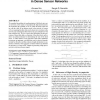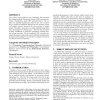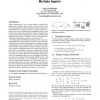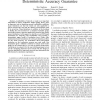301 search results - page 24 / 61 » Reconsidering Network Effect Theory |
INFOCOM
2007
IEEE
14 years 3 months ago
2007
IEEE
—Unstructured networks (like ad-hoc or peer-to-peer networks) are networks without centralized control of their operation. Users make local decisions regarding whether to follow ...
WSNA
2003
ACM
14 years 2 months ago
2003
ACM
We consider the problem of synchronization of all clocks in a sensor network, in the regime of asymptotically high node densities. We formulate this problem as one in which all cl...
ACMICEC
2008
ACM
13 years 11 months ago
2008
ACM
Prior theory and empirical work emphasize the enormous free-riding problem facing peer-to-peer (P2P) sharing networks. Nonetheless, many P2P networks thrive. We explore two possib...
ATAL
2003
Springer
14 years 2 months ago
2003
Springer
Agents collaborating on a set of tasks subject to temporal constraints must coordinate their activities to ensure that all of the temporal constraints are ultimately satisfied. S...
INFOCOM
2011
IEEE
13 years 14 days ago
2011
IEEE
—Localizability of network or node is an important subproblem in sensor localization. While rigidity theory plays an important role in identifying several localizability conditio...




